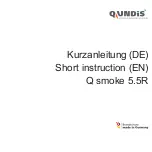
OWNERS MANUAL OF HSD006 RF SMOKE DETECTOR
Keystone’s HSD006 Radio Photoelectric Smoke Detector will work with any one of
Keystone’s multi-channel receivers HRX005, HRX006, and HRX006A or the K600RF
Wireless Control Panel.
INSTALLATION OR MOUNTING INFORMATION
Your smoke alarm is designed for easy mounting on a wall or ceiling. First, find a location for the
HSD006 according to the instructions for recommended location below. It is strongly suggested
that before holes are drilled in a ceiling or wall, you learn the transmitter code to the receiver and
check that the radio signal can reach the receiver. Re-locate either the HSD006 or the receiver if
range problems arise and try again.
Disconnect the smoke detector from the mounting bracket via the 3 way mini connector adjacent to
the red jumper and insert three 1.5V batteries into the battery compartment in the mounting bracket,
respecting the correct polarity. The transmitter portion of the HSD006 is contained in the
mounting bracket. This transmitter comes randomly pre-coded from the factory with one of more
than 59,000 different codes. To match this code with either the HRX006A or the K600RF Control
Panel, code the transmitter as follows:
•
The Receiver has a ‘self–learn’ function. Power up the receiver and press the ‘self-learn’
button on the receiver pcb.
•
With the HSD006 transmitter at least one metre away from the receiver, press the test
button located on the edge of the mounting bracket. The red LED will illuminate and a
transmission will automatically be sent to the receiver.
•
The code has now been learnt to the receiver.
•
For further details, consult the receiver manual
The HSD006 is a 6-channel device. It comes preset to transmit on Channel 1. Set the 3 way
dipswitch in the mounting bracket to transmit on the following channels. Refer to the receiver
manual for information as to which receiver output wire corresponds to which channel:
Channel 1 = Dipswitch 1 set to ON, Dipswitches 2 and 3 set to OFF
Channel 2 = Dipswitch 2 set to ON, Dipswitches 1 and 3 set to OFF
Channel 3 = Dipswitch 3 set to ON, Dipswitches 1 and 2 set to OFF
Channel 4 = Dedicated Low Battery Channel (see below)
Channel 5 = All three dipswitches set to OFF
Channel 6 = Dipswitch 1 set to OFF, Dipswitches 2 and 3 set to ON
TRANSMITTER LOW BATTERY SIGNAL
– The HSD006 can send a low battery signal to the
receiver when the transmitter’s batteries are low. Note that this low battery signal only applies to
the transmitter batteries. A separate 9V battery powers the Smoke Detector portion and the Smoke
Detectors built-in sounder will start to beep if this 9V battery goes low.
The red jumper selects whether the transmitter low battery feature is enabled or disabled. If the
jumper is set to ON, it means that a transmitter low battery signal will be sent on Channel 4 together
with the channel that the transmitter has been set to. Since the transmitter batteries should usually
last longer than the sensor battery, it may be preferable to set the jumper to OFF, so as to avoid false
alarms, and change the transmitter batteries over as a matter of course each time the sensor battery
is changed.
Once the transmitter has been correctly coded to the receiver and range tested, you need to complete
the mounting procedure. Place the mounting bracket on the wall or ceiling. Use a pencil to mark
two drill-holes on the wall or ceiling. Check the size of the screws provided and use a drill to drill
the two holes on the wall or ceiling, then attach the mounting bracket on the wall or ceiling with the
screws provided.
Now, install the Smoke Detector’s 9V battery, then twist and lock the smoke alarm on the mounting
bracket. Note that the smoke detector is equipped with a safety feature which prevents insertion of
the mounting bracket unless a battery is already correctly installed. If your smoke alarm will not
lock into the mounting bracket, check to make sure a battery is correctly installed.
After completion, check the solid (durable/ reliable) mounting of your smoke alarm. Otherwise
improve it if necessary.
RECOMMENDED LOCATION OF THE HSD006 SMOKE DETECTOR
* Locate the first smoke alarm in the immediate area of the bedrooms. Try to protect the exit path
as the bedrooms are usually farthest from an exit. If more than one sleeping area exists, locate
additional smoke alarms in each sleeping area.
* Locate additional smoke alarms to protect any stairway as stairways act like chimneys for
smoke and heat.
* Locate at least one smoke alarm on every floor level.
* Locate a smoke alarm in any area where a smoker sleeps or where electrical appliances are
operated in sleeping areas.
* Smoke, heat and other combustion products rise to the ceiling and spread horizontally.
Mounting the smoke alarm in the ceiling in the center of the room places it closest to all points
in the room. Ceiling mounting is preferred in ordinary residential construction. However, in
mobile homes, wall mounting on an inside partition is preferred to avoid the thermal barrier that
may form at the ceiling.
* When mounting smoke alarm on the ceiling, locate it a minimum of 10cm (4 inches) from a
side wall and 0.61 metres (2 feet) from any inside corner (see Diagram A).




















